Herbert Levin
by the Levin/Freeman Family
CBGD…A Cause Binding a Grandfather’s Descendants. Since no one can pronounce nor understand the name of this disease, let’s give it new meaning.
Eric Freeman, Herb’s grandson
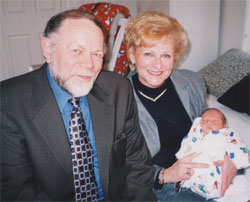 My Grandpa Herb won’t be at my Bar Mitzvah. He was diagnosed with CBGD (Cortical Basal Ganglionic Degeneration; also known as CBD – Corticobasal Degeneration) when I was eight and I’ve seen his condition get progressively worse. Now he is in a wheelchair most of the time and does not eat or drink like he used to. Sometimes he doesn’t remember who I am or why my brother and I are visiting him. He also takes many pills each day which is sort of scary.
My Grandpa Herb won’t be at my Bar Mitzvah. He was diagnosed with CBGD (Cortical Basal Ganglionic Degeneration; also known as CBD – Corticobasal Degeneration) when I was eight and I’ve seen his condition get progressively worse. Now he is in a wheelchair most of the time and does not eat or drink like he used to. Sometimes he doesn’t remember who I am or why my brother and I are visiting him. He also takes many pills each day which is sort of scary.
My Mom, aunts and uncles visit every weekend to help out my Grandma Sandy and when we get together to celebrate a holiday we meet at their house. I remember when I was little and we’d get together to celebrate Hanukkah, he always brought us the latest Hess trucks. He would make sure the batteries were in, show us how to open up the truck to reveal the smaller vehicles inside and then push the switch to turn on the lights and sounds. They were the coolest trucks and I always looked forward to getting them.
It is sad seeing him this way, unable to move much or do things for himself. I see this disease impacting him more and more and I fear that he may not be with us much longer. That is why for my Mitzvah project I chose to team up with CurePSP.org. My goal is to raise awareness so more people know about this disease and spread the word to their loved ones who may not be getting properly diagnosed. I am also raising money and donating a portion of my Bar Mitzvah gifts to fund research into the cause(s) and treatment(s) of CBGD. I hope that by working together, we can soon find a cure.
Jeri Freeman, Herb’s daughter
I always thought of my Dad as the strong, silent type. Standing 6’4”, he was an imposing figure to those who didn’t know him but a gentle giant to those that did. He rarely raised his voice but when he did, he meant it. He was hardworking and dedicated to his family; rising early to commute into New York City and always home for dinner by 6pm. My Dad’s life was fairly ordinary: he married his high school sweetheart, served in the army and had three kids before he was 30. He graduated from the College of Aeronautics, was fascinated by flying planes and built replicas when he no longer flew. He always enjoyed working with his hands and today still moves his fingers as if he’s putting something together. When I was around eleven years old, I remember helping him finish our basement and marveling at how meticulously he worked. By then our family had expanded and we needed to build another bedroom in the basement. You see, my natural mother passed away just before her 33rd birthday, my Dad was only 35 and had three kids under the age of ten. He eventually began dating and ultimately met and married a woman who had two children of her own. We were known around the neighborhood as the “Brady Bunch” although we were only five children spanning just six years from youngest to oldest.
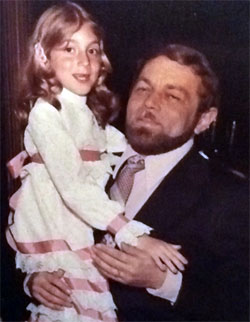 As you might imagine, life was pretty hectic in our household but my Dad was pretty relaxed and easygoing. I can’t recall him ever complaining about much except he wished we turned the lights off more and got 100’s on tests instead of 99’s. He’d always wonder where the extra point was. Whenever we asked him what he wanted for a gift, whether it was for his birthday, anniversary, Father’s Day or Hanukkah, he always gave the same response: “good children”. We would tell him he already had that but his response never changed. It couldn’t have been easy providing for us all of those years but you would never know it from his demeanor. We called him our “Bearded Leader” as he calmly and efficiently presided over our family of seven.
As you might imagine, life was pretty hectic in our household but my Dad was pretty relaxed and easygoing. I can’t recall him ever complaining about much except he wished we turned the lights off more and got 100’s on tests instead of 99’s. He’d always wonder where the extra point was. Whenever we asked him what he wanted for a gift, whether it was for his birthday, anniversary, Father’s Day or Hanukkah, he always gave the same response: “good children”. We would tell him he already had that but his response never changed. It couldn’t have been easy providing for us all of those years but you would never know it from his demeanor. We called him our “Bearded Leader” as he calmly and efficiently presided over our family of seven.
Now he no longer has a beard. It was shaved off in the hospital over a year ago and is apparently too hard for the aides to maintain. Ever since then, he hasn’t seemed like my Dad. While he was diagnosed with CBGD in July 2008, we knew something was going on for at least a year or two prior. My Mom left no stone unturned, dragging him around for all sorts of tests and making appointments with all sorts of specialists until the diagnosis of CBGD was reached. Fortunately my Mom is a very persistent and determined woman who would not rest until the diagnosis made sense. Now she is my Dad’s primary caretaker, ensuring he keeps moving as much as possible, he eats healthy meals and is safe. It is a full time job even with a live-in aide, 24 hours a day, 7 days a week. Now when our family gets together it is always at their house as it is too disruptive to take my Dad anywhere besides doctors’ appointments. He gets disoriented and confused, plus due to his size and strength, it’s hard to physically get him places as his balance and coordination are limited.
This disease is the worst of all worlds, slowly stealing his abilities one at a time from thinking and remembering, to conversing and moving. It is extremely hard to watch someone you love struggle with the simplest of tasks we take for granted every day. I can’t even imagine what it’s like to be that person. We no longer know what he’s thinking or feeling because he can’t tell us.
He still speaks at times but his words are often jumbled or referring to events in the past. He is basically trapped in a body he is losing control over. For now, my family is keeping him comfortable and safe and taking one day at a time because you never know what tomorrow will bring.
My hope is that Eric’s contribution to CurePSP.org will help other families in the future by becoming aware of this disease and the research that they support will either find a cure or treatment for this horrible disease. Please join us in spreading the word and sharing our story with everyone you know. Thank you so very much.
Sandra Levin, Herb’s wife
Having my beloved husband, Herb, diagnosed with such a devastating illness left me completely numb. At first, I didn’t realize what the diagnosis really meant but, in time, the reality began to sink in.
Here is our story.
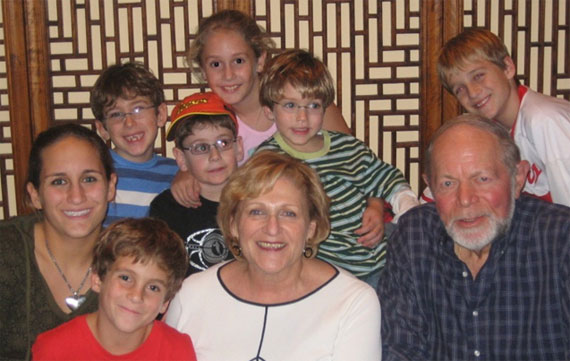
In 2007, I began to notice subtle changes in Herb’s personality and physical abilities. His coordination was off and he could no longer do little tasks, which was very odd because he was always very handy around the house. He began to find it difficult to pay the bills and handle our finances which he had always done with ease. He also stumbled and fell occasionally. He became much quieter and lacked interest in activities. I discussed this with my primary care physician and he said Herb was just bored because he was no longer working. He added that Herb was a quiet man and didn’t think there was any reason to be concerned.
In 2008, I took matters into my own hands and had him evaluated at the Neurological Institute at Columbia University Hospital – Division of Aging and Dementia. At that point, it was noticeable that his cognitive abilities were starting to diminish. After extensive testing, two neurologists came up with two different diagnoses: Alzheimer’s and CBGD. We had never heard of CBGD but after further investigation it was clear that CBGD was the correct diagnosis given the physical symptoms that were emerging.
At the end of 2011, he had another fall and was hospitalized. That went very badly because he developed infections and urinary problems, so he ended up staying in the hospital for a month and was then transferred to a rehabilitation facility for another month. When he ultimately came home, he was in very bad shape and needed full time help, 24 hours a day. I am very lucky that we have long term care insurance that helps with the expense of a live-in aide. Medicare was very insufficient in terms of providing long term therapy but I was persistent and got extra services which helped to get him walking again.
When he was first diagnosed, Herb went to adult day care three times a week which was great for both of us. At that time, we were still able to socialize with friends but now we no longer do as the disease has greatly affected his mobility, his memory and his speech (aphasia). It is a progressive disease and to combat the memory loss he was originally given Aricept, now he takes Namenda (medications commonly prescribed for Alzheimer’s patients). We think he is aware sometimes but is unable to express himself. Herb’s body gets rigid at times, so his doctor prescribed Carbidopa-Levodopa, which is commonly given to those suffering from Parkinson’s disease. Sometimes he gets combative, which is so unlike him because he’s always been so gentle and easygoing. When that happens, we give him Seroquel to calm him down.
Being Herb’s primary caretaker requires me to advocate for him on all levels. Aside from his daily care, I spend much of my time dealing with doctors, insurance companies, Medicare and coordinating his therapy. Since Herb is a veteran, he qualifies for an additional six hours of help each week through the Veterans’ Administration. In addition, now that he is home bound, all of his medications come through the VA. I also purchased a supplemental Rx Medication Plan from AARP to cover medications that may be required suddenly.
As the disease has continued to evolve, there have been swallowing issues. At first, all his liquids had to be thickened. Now he has difficulty with secretions that build up in his mouth and he must be aspirated so he doesn’t choke. His illness is definitely progressing and at times he can no longer feed himself. He is well cared for with the help of his aide. We have developed a routine which works most days. He is showered daily and sits upright in his wheel chair most of the day. It takes two people to walk him with his walker which we do twice a day. Herb also naps and goes to bed early.
When our family is together I assume he is happy to see everyone but I really don’t know what he is aware of. I try to cope with each day as best I can and at times it is more difficult to care for him even with our aide. Herb is still looking physically well but, of course, he is no longer the man he was. It does give me comfort to know he is well taken care of and I can see him every day. My goal is to keep him home until such time we can no longer physically handle him. Only God knows when that will be.
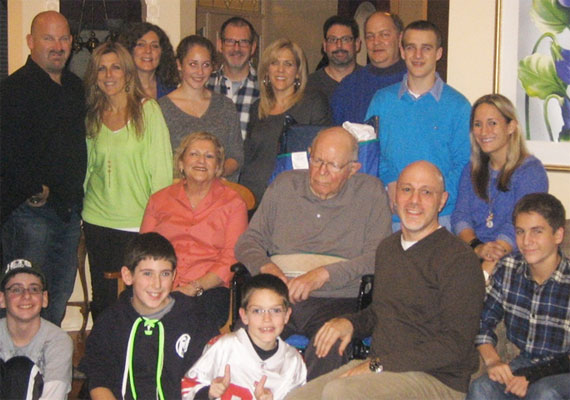
Brett Freeman, Herb’s grandson
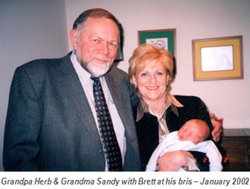
My Grandpa Herb passed away on Superbowl Sunday after a long battle with CBGD (Cortical Basal Ganglionic Degeneration, also known as CBD). I remember how sad my mom got when she told us but she also said he was in a better place and no longer suffering. I felt very sad as it had been a long time since he could go places and interact with us. The last time he was able to visit us, he came to my soccer game and I remember being extra proud whenever I made a good play because he was watching. He always wanted the best for our family and wanted everyone to be happy and healthy.
Watching him get worse and worse was really hard and I don’t want others to experience that. That is why I’m raising awareness and funds for CurePSP.org. I don’t think many people have ever heard of CBGD and I want people to know the signs so their loved ones can be diagnosed quickly. I also plan to donate a portion of my bar mitzvah gifts to contribute to research to someday find a cure so more grandparents and their families don’t have to endure what my grandpa did.